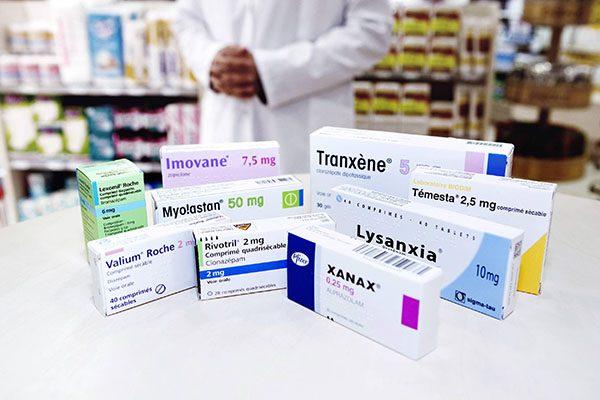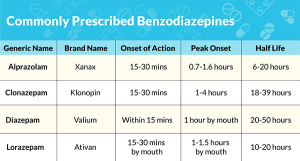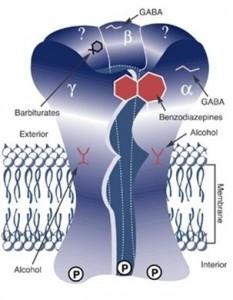
Benzodiazepines

Pharmacological properties
Benzodiazepines work in the body by increasing the amount of gamma-aminobutyric acid in the brain and reducing neuronal excitability. This reduces the interaction between neurons, which manifests itself in a calming effect on many brain functions.
Some of the drugs are half removed from the body within half a day, while others have a long-lasting effect and last for weeks:
half eliminated in 12 hours: triazolam, brotizolam, midazolam;
eliminated in 40 hours: temazepam, lorazepam, estazolam, nitrazepam, clonazepam, flunitrazepam
up to 250 hours: diazepam, flurazepam, clorazepate.
Trade names of drugs
The list of drugs based on benzodiazepine derivatives is numerous. The most widely used are:
Alzolam;
Alprox;
Apaurin;
Bromidem;
Grandaxin;
Diazepam;
Xanax;
Lorafen;
Mesapam;
Nosepam;
Oxazepam;
Relanium;
Seduxen;
Sibazon;
Tazepam;
Helex;
Elenium.
Many drugs with antidepressant and anti-anxiety activity are often confused with benzodiazepines. For example, Atarax is not one of them, but is classed as an anxiolytics – anti-anxiety agents, histamine-blockers. Despite the similarity of action in some effects, they are drugs of different pharmacological groups.
Most benzdiazepines are dispensed by prescription because they have pronounced tranquilizing properties. Over-the-counter medications with similar effects can be picked up in other pharmacological groups, but with the involvement of a specialist.

The place of benzodiazepines in medicine
Benzodiazepine-type drugs are used in several medical fields because of their main sedative action, which eliminates unwanted symptoms in many medical conditions. Each of the drugs has its own trade name and a separate active ingredient, but they all belong to the same chemical series of compounds, so they are combined into groups.
Among the areas of application are:
General anesthesiology. Benzodiazepines cope better than neuroleptics and barbiturates with the tasks of premedication, during which the patient is prepared for surgery.
Local anesthesiology. Benzodiazepines have a sedative effect and raise the seizure threshold during interventions under such anesthesia.
Neurology. Drugs in this group can protect the brain from a lack of oxygen supply and are used in critical states.
Psychotherapy. Benzodiazepines are actively used in the treatment of mental illnesses of varying severity.
The widest range of use is in psychiatry. Despite the safety of using benzodiazepines in short courses, paradoxical reactions are possible. These are called manifestations that are the opposite of the desired effects. For example, benzodiazepines are prescribed for depression, and in response to treatment, the disease worsened.
Psychotherapy Applications
Benzodiazepines have a range of properties that allow them to deal with severe psychiatric conditions and pathologies of moderate severity. The main effects of administration are:
sedative;
soporific;
anxiolytic (anti-anxiety);
anticonvulsant;
amnestic;
Myorelaxative (relaxing the muscles).
Benzodiazepines can be used for a variety of indications, including anxiety, insomnia, panic, and seizures. In most cases, the medications are well tolerated, but long-term treatment can decrease their effectiveness and lead to withdrawal symptoms after discontinuation.

Panic disorder
Benzodiazepine drugs are often used to treat anxiety in panic attacks because of the rapid onset of sedative effects. Opinions of leading American psychotherapists differ on this point. Some believe that antidepressants are more effective in the treatment of panic disorder. But in the initial stages of the pathology benzodiazepines are also prescribed.
The advantage of drugs over antidepressants in the fight against panic disorder is the rapid onset of sedative effect. The disadvantage is one – the possibility of developing dependence.
The American Psychiatric Association does not recommend benzodiazepine medications for patients with depression or substance abuse. To achieve the effectiveness of treatment, the main therapy is carried out with antidepressants, methods of psychotherapy, and these drugs are used situationally – at the next panic attack.
Generalized anxiety disorder
Benzodiazepine medications are effective in managing the symptoms of generalized anxiety disorder (GAD), which significantly reduce patients’ quality of life. The practice of such treatment is known all over the world, so there is a certain set of rules of Grief therapy with these drugs:
Are suitable for short-term use only;
Are used to treat symptoms but not to cure the pathology;
Are prescribed for no more than one month of regular use;
be gradually withdrawn without a drastic reduction in doses.
Benzodiazepines for GAD are prescribed in combination with antidepressants and psychotherapy.

Insomnia
Drugs in this group are convenient for use in the short-term treatment of insomnia. The duration of use should also not exceed four weeks. Effects of benzodiazepines in insomnia:
Eliminate intrusive thoughts that interfere with sleep;
shorten the time to fall asleep;
Restore the physiological structure of sleep;
prolong the time of rest;
Restore the depth of sleep.
Among the disadvantages of using them for insomnia is the possibility of addiction, as a result of which the patient will not be able to fall asleep without the drugs after withdrawal of benzodiazepines.
Seizures
Prolonged epileptic seizures are a severe condition that requires immediate care. It is treated with fast-acting benzodiazepines, which have a strong effect. The drugs are used intravenously in inpatient settings. When seizures overtake the patient at home, the means are used in oral and rectal forms.
With prolonged treatment of epilepsy with benzodiazepines, residual effects – drowsiness, weakness – may increase. Later the effect of the drugs may decrease due to the development of tolerance. This means that the use of the drugs becomes habitual for the body, it no longer reacts by changing the state.

Alcohol dependence
Drugs of this group are preferred in alcohol detoxification, especially in those groups of patients who are motivated to stop drinking. Convulsive effects may develop if taken for a long time.
Benzodiazepines are able to prevent alcohol withdrawal syndrome, so they are also used as prevention of acute attacks of alcohol dependence. An advantage of the drugs is also the fact that aggression and instability typical for patients are also eliminated by these drugs.
Other indications
Benzodiazepine drugs are also used for other indications due to their wide range of actions. These include:
Calming patients under stress or in the ICU on a ventilator;
reducing pre-operative anxiety and phobias about certain doctors such as the dentist or surgeon;
relieving muscle spasms for a short period of time;
treatment of acute panic caused by hallucinogen poisoning;
Emergency treatment of psychosis, mania, schizophrenia;
treatment of restless legs syndrome, obsessive-compulsive disorder;
elimination of the negative effects of electroconvulsive therapy.
If a doctor has prescribed a drug from the benzodiazepine group, there is no need to classify yourself as severely ill – these drugs are equally effective for moderate conditions and for serious ones.

Adverse reactions
The side effects of benzodiazepines are associated with muscle relaxation and sedation. They include the following:
decreased concentration;
drowsiness;
dizziness;
decreased coordination;
erectile dysfunction and decreased libido;
Hypotension and respiratory depression – more common with intravenous administration;
confusion;
euphoria;
blurred vision;
nightmares;
depersonalization.
In some cases, high liver toxicity has been described, but this effect is the exception, not the rule. Another consequence of use may be a decrease in driving skills, which is dangerous due to the high probability of traffic accidents, so driving is contraindicated during treatment.
Paradoxical effects
Paradoxical reactions may develop during the first 3-5 days after the start of treatment with benzodiazepines. These include:
Increased seizures;
violence;
aggression;
irritability;
fickleness;
suicidal thoughts and behavior.
The frequency of occurrence of these reactions does not exceed one percent, but the patient’s relatives should be informed about the possibility of paradoxical effects before starting treatment. They may also develop against the background of long-term uncontrolled use of benzodiazepines.
Long-term effects
Long-term effects of benzodiazepine treatment may include cognitive impairment and behavioral problems. Major ones include:
difficulty trying to think constructively;
Sociophobia;
loss of sexual desire;
loss of interest in hobbies and leisure activities;
inability to express emotions;
changes in perception of oneself and the world around.
The manifestation of long-term undesirable effects is also not observed in all patients and is often the result of inadequate treatment regimen or unsupervised use.
Withdrawal Syndrome.
Dependence on benzodiazepines is a major problem associated with their use in treatment. Tolerance to a drug is defined as a decrease in its effectiveness as a sleeping aid, sedative, and anti-anxiety medication, even though the patient is taking the same dosage. This is an individual parameter, so during clinical trials of benzodiazepines, it was also found to retain efficacy even after six months of use.
Memory impairment after drug treatment is an unconfirmed assumption. Maximum long-term and only partial loss of it was observed within one and a half hours after high doses were administered intravenously.
A sharp decrease can lead to the development of withdrawal syndrome, or withdrawal. In this case, there is a sharp return of those conditions for which benzodiazepines were prescribed, but on a larger scale. With withdrawal syndrome, old symptoms do not appear, but new ones do. For example, after treating anxiety and abruptly stopping the use of benzodiazepines, the person becomes depressed and cannot sleep at night.
Symptoms of withdrawal
The most common symptoms indicative of withdrawal syndrome are:
Insomnia;
digestive problems;
trembling of the extremities;
sweating;
irritability;
muscle spasms;
depression;
suicidal thoughts;
seizures.
Severe symptoms develop after stopping treatment too quickly. Signs can also appear when the dosage is gradually reduced. In such a case, the previous amount of medication is taken again for several days, and then it is reduced by a smaller margin.
Severe withdrawal syndromes can persist for a year or more. In this case, the effects they cause require medication correction with drugs from other groups. Most often during the first two months, the symptoms subside and are blunted.
Overdose
Benzodiazepines are safer than the barbiturates that precede them. On their own, they rarely cause severe overdoses. But there are dangerous combinations that can at least cause poisoning.
Taking benzodiazepines at the same time as opiates, alcohol, and tricyclic antidepressants greatly increase their toxic effects on the body.
Older people are more susceptible to adverse reactions, so they sometimes overdose even with long-term use in standard amounts.
Symptoms of overdose:
drowsiness;
slurred speech;
decreased tendon reflexes;
respiratory depression;
decreased blood pressure;
coma.
In case of overdose, the antidote is flumazenil, which has shown high efficacy in a single overdose, but also has a number of serious contraindications, such as low seizure threshold, arrhythmia, long-term treatment with benzodiazepines, advanced age and others.
If symptoms are detected, it is necessary to seek medical attention immediately. Do not attempt to correct an overdose on your own.
Contraindications
Contraindications are related to the relaxing effect of benzodiazepines on muscles. They include:
myasthenia gravis;
nocturnal apnea;
bronchitis;
personality disorders;
chronic obstructive bronchitis of the lungs;
mental retardation;
clinical severe depression;
abuse of alcohol, barbiturates, and opioids.
Before use, notify the physician of all medications being taken and present medical records so that the specialist can review the medical history and prevent the use of benzodiazepines by finding contraindications.
Conclusion
Benzodiazepines are a large group of medications with a broad spectrum of action on the human central nervous system. Properly selected dosages and adequate courses of treatment allow good results to be achieved and consolidated.
Independent use is fraught with the development of withdrawal syndrome, adverse reactions and deterioration of well-being.
